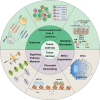Mechanism and strategies of immunotherapy resistance in colorectal cancer
- PMID: 36238278
- PMCID: PMC9550896
- DOI: 10.3389/fimmu.2022.1016646
Mechanism and strategies of immunotherapy resistance in colorectal cancer
Abstract
Colorectal cancer (CRC) is the third most common cancer in the world. Although there are standard treatment options for CRC, most patients respond poorly to these treatments. Immunotherapies have gradually emerged due to the increasing awareness and understanding of tumor immunity, exhibiting good therapeutic efficacy in various cancers. Immunotherapies include cytokines, immune checkpoint inhibitors (ICIs), and adoptive cell therapies. In particular, ICIs, which are antibodies against cytotoxic T lymphocyte-associated protein 4 (CTLA-4), programmed cell death 1 (PD-1), or its ligand PD-L1, have been successfully applied clinically for solid tumors, relieving the inhibitory effect of the tumor microenvironment on T cells. However, only a minority of patients with cancer achieve a durable clinical response during immunotherapy. Several factors restrict the efficacy of immunotherapy, leading to the development of drug resistance. In this review, we aimed to discuss the current status of immunotherapy for CRC and elaborate on the mechanisms that mediate resistance to immunotherapy and other potential therapeutic strategies.
Keywords: colorectal cancer; drug resistance; immune checkpoint inhibitors; immunotherapy; potential therapeutic strategies.
Copyright © 2022 Shan, Han, Shen, Lei and Zhang.
Conflict of interest statement
The authors declare that the research was conducted in the absence of any commercial or financial relationships that could be construed as a potential conflict of interest.
Figures



Similar articles
-
PD-1/PD-L1-dependent immune response in colorectal cancer.J Cell Physiol. 2020 Jul;235(7-8):5461-5475. doi: 10.1002/jcp.29494. Epub 2020 Jan 21. J Cell Physiol. 2020. PMID: 31960962 Review.
-
PD-1/PD-L1 immune checkpoint blockade-based combinational treatment: Immunotherapeutic amplification strategies against colorectal cancer.Int Immunopharmacol. 2021 Jul;96:107607. doi: 10.1016/j.intimp.2021.107607. Epub 2021 Apr 5. Int Immunopharmacol. 2021. PMID: 33831809 Review.
-
Molecular insights into clinical trials for immune checkpoint inhibitors in colorectal cancer: Unravelling challenges and future directions.World J Gastroenterol. 2024 Apr 7;30(13):1815-1835. doi: 10.3748/wjg.v30.i13.1815. World J Gastroenterol. 2024. PMID: 38659481 Free PMC article. Review.
-
How to overcome tumor resistance to anti-PD-1/PD-L1 therapy by immunotherapy modifying the tumor microenvironment in MSS CRC.Clin Immunol. 2022 Apr;237:108962. doi: 10.1016/j.clim.2022.108962. Epub 2022 Feb 25. Clin Immunol. 2022. PMID: 35227870 Review.
-
News on immune checkpoint inhibitors as immunotherapy strategies in adult and pediatric solid tumors.Semin Cancer Biol. 2022 Feb;79:18-43. doi: 10.1016/j.semcancer.2020.07.001. Epub 2020 Jul 10. Semin Cancer Biol. 2022. PMID: 32659257 Review.
Cited by
-
Photodynamic Therapy against Colorectal Cancer Using Porphin-Loaded Arene Ruthenium Cages.Int J Mol Sci. 2024 Oct 9;25(19):10847. doi: 10.3390/ijms251910847. Int J Mol Sci. 2024. PMID: 39409175 Free PMC article.
-
Chemoproteomic discovery of a covalent allosteric inhibitor of WRN helicase.Nature. 2024 May;629(8011):435-442. doi: 10.1038/s41586-024-07318-y. Epub 2024 Apr 24. Nature. 2024. PMID: 38658751
-
Identification of the molecular subtypes and signatures to predict the prognosis, biological functions, and therapeutic response based on the anoikis-related genes in colorectal cancer.Cancer Med. 2024 May;13(10):e7315. doi: 10.1002/cam4.7315. Cancer Med. 2024. PMID: 38785271 Free PMC article.
-
Gut microbiota: A novel and potential target for radioimmunotherapy in colorectal cancer.Front Immunol. 2023 Jan 31;14:1128774. doi: 10.3389/fimmu.2023.1128774. eCollection 2023. Front Immunol. 2023. PMID: 36798129 Free PMC article. Review.
-
IL-2RG as a possible immunotherapeutic target in CRC predicting poor prognosis and regulated by miR-7-5p and miR-26b-5p.J Transl Med. 2024 May 8;22(1):439. doi: 10.1186/s12967-024-05251-2. J Transl Med. 2024. PMID: 38720389 Free PMC article.
References
Publication types
MeSH terms
Substances
LinkOut - more resources
Full Text Sources
Medical
Research Materials

